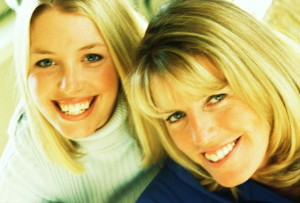Sigmund Freud was wrong about a lot of things pertaining to human nature but there was one thing he got right; our relationship with our mother has a huge effect on the person we become.
For some, being told ‘you’re just like your mother’ is a compliment, to others it’s an insult. And for many others it’s somewhere in between.
Now, I have to admit that I’ve been thinking more about my own mother of late, which in itself is probably a bit weird (and she’s probably reading this right now) but it’s all because of my grandmother’s birthday party.
Last month my maternal grandmother turned 80 and she gave a speech in which she said something to the effect of: “Thank you all so much for coming, I don’t deserve it.” This was no ploy, or stunt, she was sincere and her eyes were moist with tears. And in this one statement I saw a woman who has come to recognise her failings, and was seeking forgiveness.
I have to admit that I don’t know my grandmother well. She was always that step removed, or detached. Aloof perhaps, is the best description. I know of her and about her, but I do not know her. Her defence mechanism in life was to ignore, or deny, that which was painful or difficult. Because to be anything less than strong is a weakness.
My mother too, has always possessed this attribute; strength in avoidance. And to be honest, they always got a lot done by that sheer determination. These are good women, who have excellent prayerful habits and are involved in charity work, but they are difficult to love well.
Not difficult to love, it must be said, but to love well.
Because in order to really be loved, in its fullest and most sanctifying sense, we have to allow ourselves to be vulnerable, to let the real us be seen, and not just the defences we put up. If we fail to let these walls down, we don’t ever give others the truest sense of us.
At times, they can feel as though we don’t see or hear them. And they make judgments about us based on this facade.
Now, I have to admit that I am more than capable of building this same defence. In fact, when my husband and I first starting courting he told me that he found me intimidating at first, he called me an ice queen.
But to let the walls come down would be to let him see the real me. Fear of rejection is a strong mortar. (But hey, it all worked out in the end because we’ve now been married for nine years).
So where am I going with this?
That’s easy; in order to be the best mother I can be I need to understand why I approach parenting the way that I do.
Each of us has a particular temperament and love language which play some part in our mothering style. But it’s also equally the case that we make decisions as a mum based on our agreement, or disagreement, with the parenting style of our own mother.
If our own mother was, for example, a housekeeper who kept up a cluttered untidy home, then we will either do exactly the same ourselves, or the opposite. For me, the biggest change I have made as a mum is to allow my children, and my husband for that matter, to see my vulnerabilities.
Instead of closing up that wall and holding something back I let my children see me cry, ask their forgiveness – which is so often “Mummy is really sorry she did … Will you forgive me?” It’s only two sentences but it is excruciating at the time and yet afterwards, I’d love to bottle that feeling – and it has led to some beautiful discussions about the frailty of man and our need for God.
To be the best mum I can be means that I cannot make decisions based on what’s going to please some authority figure in my life, no matter how much I love them. It means having the courage to make myself vulnerable, to put myself out there and accept the consequences of that step of faith.
And now that I can understand why my mum, and her mum, felt the need to hide behind their facades, I can appreciate that behind those carefully constructed artifices are two women who are beautiful, unique and loveable, if they would only have the courage to step out from behind the wall and give the world the gift of themselves.
We are none of us perfect but we are perfectly us.
God is asking nothing more of us than to be wholly ourselves and to put our trust in Him. I am not a perfect mother, nor will I ever be, and as adults and parents my children will make their own decisions based on my strengths and weaknesses as a parent.
And all I want, at the end of the day is for my kids to be able to say: “My mum wasn’t perfect but she tried to do the right thing for us.” None of us has a perfect relationship with our mother and we may even harbour some resentment towards her.
Breaking through these emotional barriers and coming to understand our mothers as frail human beings, the motivations behind their actions, will help us come to greater appreciation of the vocation that we share with them.
Originally posted 2016-11-23 15:00:12.


Oh my goodness. Thank you. Just last night I was talking to my husband about my mum and along the same lines that you have written here. Becoming a mother has softened my view of my own mum and this has further prompted me to initiate some healing here. Thanks again!
I’m so glad. All the best for the healing process!
This was beautiful Emily and so true! Now if i could only understand my mother-in-law!
Thank you Emily for such an honest & insightful article. I’m not a mum myself but still your reflections rang true for me. So much of how I ‘mother’ as a woman to those around me is shaped by my own mother – both my strengths and weaknesses. You’ve encouraged me to try and bring more understanding, acceptance and love into my relationship with her. I pray with God’s help we can be ‘perfectly us.’ Thank you.
You’re very welcome Grace!